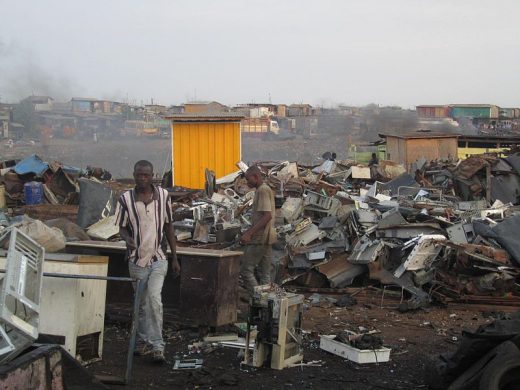GENEVE, 12 May 2015 – Up to 90 per cent of the world’s electronic waste, worth nearly US $19 billion, is illegally traded or dumped each year, according to a report released today by the United Nations Environment Programme (UNEP).
Each year, the electronic industry – one of the world’s largest and fastest growing – generates up to 41 million tonnes of e-waste from goods such as computers and smart phones.
Forecasts say that figure may reach 50 million tonnes already by 2017.
A staggering 60-90 per cent of this waste is illegally traded or dumped, according to UNEP’s “Waste Crimes, Waste Risks: Gaps and Challenges In the Waste Sector”, launched today in Geneva, at the Conference of Parties to the three major conventions addressing the global waste issue, the Basel, Rotterdam and Stockholm Conventions.
The International Criminal Police Organization (INTERPOL) estimates the price of a tonne of e-waste at around US $500.
Following this calculation, the value of unregistered and informally handled, including illegally traded and dumped e-waste ranges from US $12.5 to US $18.8 billion annually.
UN Under-Secretary-General and Executive Director of UNEP, Achim Steiner said:
“We are witnessing an unprecedented amount of electronic waste rolling out over the world. Not only does it account for a large portion of the world’s non-recycled »waste mountain«, but it also poses a growing threat to human health and the environment, due to the hazardous elements it contains.”
“Through enhanced international cooperation and legislative coherence, stronger national regulations and enforcement, as well as greater awareness and robust prevention measures we can ensure that the illegal trade and dumping of e-waste is brought to an end”.
“This will create a win-win situation, whereby rare and expensive elements are safely recycled and reused, boosting the formal economy, depriving criminals of income and reducing health risks to the public,” he added.
Innovative solutions to combat illegal and unsustainable handling of e-waste are emerging. Recovering valuable metals and other resources locked inside electronic products, for example, can reduce the amount of e-waste produced, diminishing pressure on the environment, creating jobs and generating income.
The growing volumes of e-waste, municipal waste, food waste, discarded chemicals and counterfeit pesticides, all contribute to increasing pressure on the environment.
The report also points to the fact that every year, roughly one third of the food produced for human consumption globally – approximately 1.3 billion tonnes, worth over US $1 trillion – is lost or wasted.
Læs videre her: http://www.unep.org/newscentre/Default.aspx?DocumentID=26816&ArticleID=35021&l=en















